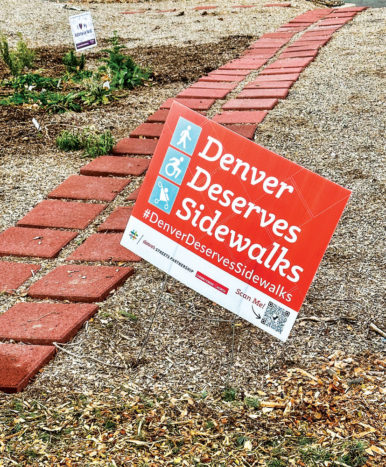
The Colorado school lunch measure was put on the ballot after the pandemic-era federal free meal program expired. The measure passed 55%-45%, and it will provide free meals for all students and wage increases for cafeteria workers. Front Porch file photo by Steve Larson
In November, Denver residents cast their votes on many ballot measures. Here are the results of some of the key city and state initiatives.

The sidewalk measure was inspired by a study demonstrating that 40 percent of Denver streets have missing or unusable sidewalks. Front Porch photo by Christie Gosch
Sidewalks
Ordinance 307 proposed to shift the responsibility of sidewalk maintenance from property owners to a newly-created city repair program. Previously, property owners were responsible to maintain and repair the public sidewalks running along their homes or buildings. However, a lack of enforcement led to many neglected sidewalks becoming deteriorated with missing sections, narrow passages, and dangerous gaps. Ordinance 307 addressed this issue by asking voters to have property owners pay an annual sidewalk tax based on the length of their sidewalks and the type of street. The program is projected to generate $40 million per year for sidewalk maintenance, and Denver voters approved this measure by a 55% to 45% margin.
Alcohol
Two of the three statewide alcohol measures were defeated. Prop 124 would have permitted liquor store owners to increase the number of licenses they could obtain and stores they could open, but it was soundly rejected by the voters 62% to 38%. Prop 126 would have allowed third-party delivery services to pick up liquor from stores or restaurants and then deliver the alcohol to customers. Although this was a closer contest, the delivery measure was also defeated by a 51% to 49% margin. The lone victory for the alcohol initiatives was Prop 125, which allows grocery stores to sell wine and which passed with 51% voter approval.
School Lunches
The school lunch program was another significant measure that was approved by voters this cycle. Prop FF asked Colorado residents to create a fund to provide free lunches for all students, regardless of family income. The program is funded by reducing the tax deductions available for the state’s wealthiest residents who earn over $300,000 annually. It is projected to raise approximately $100 million a year.
Affordable Housing
The approval of Proposition 123 addresses the affordable housing crisis in Colorado. The ballot measure puts 0.1% of all taxable income into an affordable housing fund that is expected to generate about $300 million a year. The funds will help local governments and nonprofit organizations acquire land for new developments, increase the stock of affordable housing, and provide assistance for low-income residents.

DPL expects the increased funding from 2I to expand the collections of popular books and reduce wait times for patrons. Front Porch file photo by Steve Larson
Denver Public Library Receives Additional Funding
With approximately 4 million visitors a year, the Denver Public Library is the most frequented cultural institution in the city. However, inadequate funding in the recent years has created many challenges, such as low wages for staff, reduced hours for branches, decreased resources for residents, and insufficient collections of books. Initiative 2I sought to increase the funding for the Denver Public Library by $36 million annually. The measure passed 68% to 32%.
“We really believe having libraries helps make communities great, and we’re really thankful to have the community say that they agree and that they support us,” says Jeff Riley, the executive director of the Denver Public Library Friends Foundation. The Friends Foundation boosts the library by raising funds from charitable donations and by providing advocacy to government agencies. Many factors motivated the Foundation to get 2I on the ballot during this election cycle.
“With the pandemic and budget cuts, our library commission studied how the library might obtain more sustainable funding rather than relying only on the general fund from the city,” says Riley. “We received recommendations for how we can get back to full service, and so this year we focused on developing 2I, bringing it to the city council, and getting it referred as a ballot measure.”
The measure requires homeowners to pay approximately $4.19 more in property taxes each month. “It was a grassroots campaign,” says Amy Brimah, who is a Central Park resident and the chair of the Friends Foundation. “We knocked on doors—including 500 in Central Park—we did a lot of texting, and we also had a signature blog. Then we went to several House District meetings, we talked to CPUN, and we met with many other neighborhood organizations.”
DPL Communications Director Olivia Gallegos believes the increased funds can help the library solve its problems and improve its services. “One of the priorities of this new funding is compensation,” says Gallegos. “We want to make sure that our librarians and staff are making competitive wages, that folks want to work with us, and that we remain a world-class library system in Denver.”
Expanding the branch hours is another crucial benefit of the better funding. “Of our 27 locations, right now we only have one branch that’s open on Sundays and only seven locations that are open on Mondays,” says Gallegos. “Plus we close at six on weekdays, and so we look forward to opening our doors on more days and expanding our hours into the evenings.”
The increased resources will be beneficial for all communities, but especially for the many low-income residents who depend on those resources to fulfill their educational and professional endeavors. “We offer free access to our book collections, library services, and technological devices.” says Gallegos. “Folks can check out Chromebooks, access our Wi-Fi, or have our Digital Navigators bring the technology to their homes. That helps a lot of folks in vulnerable communities bridge the digital divide, and so we’re looking forward to expanding those popular services.”


0 Comments